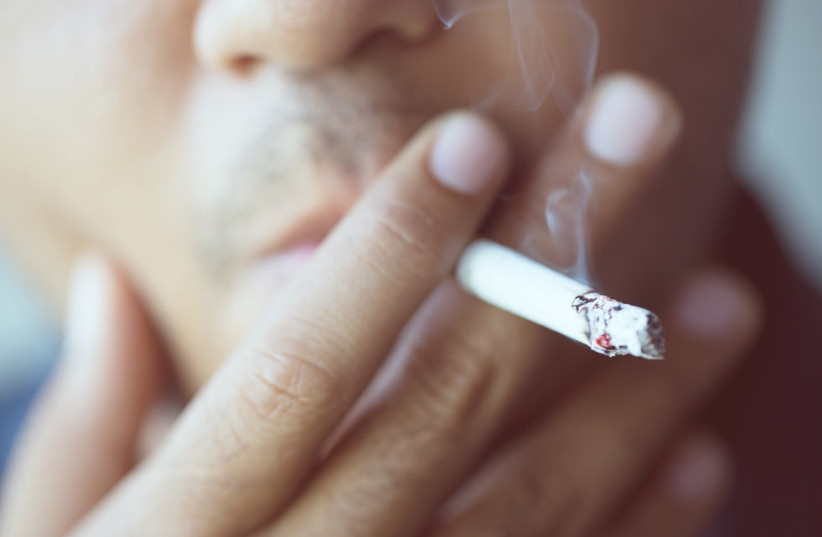The High Court of Justice is now reviewing an application filed against several government ministries for not acting to prevent harmful second-hand smoke (SHS) caused by neighbors who smoke in balconies, houses, yards, or next to windows. The ministries are required to present their sides on this prickly issue to the court by the end of August, and then the hearing will take place on September 13.
The Health Ministry, which along with the Environmental Protection Ministry and National Security Ministry, was accused by the appellants of not acting against the smokers, has so far declined to make a statement but said it would do so only at the court case.
This was despite the announcement by Minister Moshe Arbel this week of an “action plan to reduce smoking,” which made no mention at all of this issue of protecting people from others’ toxic smoke.
What is the danger of smokers harming others via second-hand smoke?
According to the researchers at the School of Public Health at the Faculty of Medicine at Tel Aviv University (TAU), their study is the first in scientific literature to provide evidence about the extent of the problem in Israel, and about the fear of damage to health resulting from SHS infiltration from neighbors’ apartments or balconies.
The study estimates that almost half the Israeli population suffers from second-hand smoke (SHS) penetrating their homes, mostly from smoking neighbors. The study also found that only one out of four families who suffers from smoke infiltrating their homes complain about it to the smoking neighbor, homeowner, or residents’ committee.

Many respondents to the phone survey reported that they were considerably troubled by the smoke from neighbors infiltrating their homes and fear for their health, but prefer not to complain to avoid unpleasantness. Some even testified that they had had to move out of their homes to another address just because neighbors had smoked incessantly.”
The study was led by School of Public Health Prof. Leah Rosen in collaboration with her graduate student Noa Theitler; Dr. Maya Peled Raz from the University of Haifa; Dr. Michal Bitan from the Academic College of Management; and Dr. Vaughan Rees from the Harvard T.H. Chan School of Public Health.
The paper was published under the title “Tobacco smoke incursion into private residences in Israel: a cross-sectional study examining public perceptions of private rights and support for governmental policies” in the Israel Journal of Health Policy Research, which is a leading health policy research journal funded by the Israel National Institute for Health Policy Research.
The present study is the third in a series of recently published papers on SHS led by the TAU researchers. In the first, published about two years ago, children of smoking parents were tested for nicotine traces, and findings indicated that 70% are in fact exposed to passive smoking.
The team also looked for traces of nicotine in the hair of children whose parents limited their smoking to the balcony or outdoors. Again, findings were disconcerting: nicotine traces were found in the hair of 60% of these children.
The latest study completes the picture, revealing a widespread phenomenon that almost 50% of Israeli families suffer from passive smoking due to smoke infiltrating their homes, especially from their neighbors. Most, however, prefer to “live with” the hazard rather than complain to the neighbors.
“The study included nearly 300 participants from across the country. Many reported that they were greatly disturbed by the smoke and feared for their health but preferred not to complain to avoid confrontation and maintain good neighborly relations,” Rosen said.
Most respondents (69.8%), including nearly half of smokers, prioritized the right of individuals to breath smoke-free air in their apartments over the right of smokers to smoke in their apartments. Women and non-smokers were more likely to support the right to breathe smoke-free air
Among study participants, tobacco smoke incursion was a common yet unwelcome experience. Most respondents believed that the right to breathe smoke-free air in one’s apartment superseded that of neighbors to smoke anywhere in their home, and most supported legislation to prevent it.
“Today, Israeli law prohibits smoking at a distance of 10 meters from public places like hospitals and schools, but it completely ignores SHS from smoking in balconies or next to windows. This is an absurd situation that leaves the public helpless in the face of a constantly growing threat. It must be emphasized that there is no such thing as a safe level of exposure to tobacco smoke.
“Even brief exposure to a small amount can cause great damage, including asthma and heart attacks. Since cigarette smoke can travel up to nine meters in the open air, it is very likely to infiltrate neighbors’ homes in crowded apartment buildings. A single smoker can cause infiltration into as many as 10 neighboring apartments,” Rosen added.
The application to the High Court of Justice was filed by the non-profit organization “Citizens for Clean Air” and six citizens, led by attorney Amos Hausner, who is chairman of the Israel Council for the Prevention of Smoking. Hausner told The Jerusalem Post that in all of the US states, a total of two million residents in low-cost public housing projects are forbidden to smoke anywhere in the building (including balconies and stairways), and if caught for third time, they lose their privilege of living in public housing.
“With nearly half of respondents testifying that they suffer from this problem, this is much more than a local dispute between neighbors. It is a widespread phenomenon that requires government intervention. If the High Court grants the support requested in the appeal and requires the government to act, millions of Israelis will be protected from the damage of tobacco smoke infiltrating their homes from outside.
“In addition, consistent with the public health impact of laws around the world limiting smoking, this can be expected to lead to reduced smoking in the population,” Rosen concluded.
